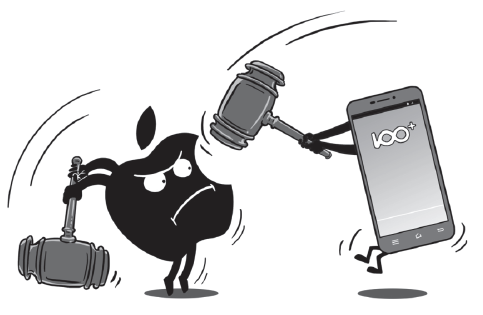 |
| Li Feng / China Daily |
Will iPhone 6 and iPhone 6 Plus be kicked out of Chinese market? Well, it depends.
Last month, Beijing Intellectual Property Office ruled that Apple had violated the patent rights of Shenzhen-based mobile-phone maker Baili Marketing Service Inc. The US tech giant has now moved Beijing Intellectual Property Court against BIPO to get the decision overturned. If Apple loses again, it could appeal to Beijing High People's Court, although the two parties could seek settlement during the course of the case, which is a common practice in patent disputes.
Based on the information on the website of State Intellectual Property Office, Baili filed the design patent for mobile phone (100C) on Jan 13, 2014, and got it on July 9, 2014. Both the dates are earlier than the official date of launch of iPhone 6 and iPhone 6 Plus on the Chinese mainland, that is, Oct 17, 2014.
The high-profile case involving a global tech giant and an almost unknown domestic company has given rise to many speculations. Some have praised BIPO's decision claiming Chinese companies have raised their IP awareness. Others say Baili is a patent troll trying to blackmail Apple into paying it money. Still others see the case in the backdrop of China-US trade dispute, saying the BIPO decision avenges the US' trade attacks against several Chinese enterprises. And a few Western media outlets feel China is adopting tougher regulations against Western companies.
The case, however, is essentially a legal dispute.
There are two misunderstandings about design patent. The first is that a patent holder must actually manufacture the product. A patent is an intellectual property right aimed at encouraging creation, and the patent law does not require the patent holder to actually make the product. And the second is the application of confusion principle to determine the similarities in designs. In the patent law, there is no need to consider the likelihood of confusion between the patented design and the accused or "stolen" design. This means, whether consumers will confuse iPhones with 100C is of no concern.
Patent is a highly complicated and professional industry. For high-tech companies, patent is not just a property right, but also a powerful weapon against competitors. Because once a new design is found infringing existing patent rights, selling of the product bearing such a design must stop.
Tech giants such as Apple, Google, and Samsung apply for thousands of patents every year to form a broad patent portfolio in order to maintain their competitive edge and drive off competitors. No wonder they are always involved in all kinds of legal proceedings, suing other companies or being sued by them no matter whether they win or lose.
In the patent battlefield, however, a small company can beat a giant. So there is no need to make a fuss about a single case and exaggerate its impact. Some people wonder how a tech giant like Apple can infringe the patent of a small company like Baili that is on the brink of bankruptcy. But this is possible in the field of patent. For example, in 2016, Apple lost a huge patent case to VirnetX and had to pay $626 million in damages. But VirnetX has been labeled a "patent troll", because despite being a patent holding company, it sells only one product.
The author is a fellow with the research office of Shunyi district people's court in Beijing.